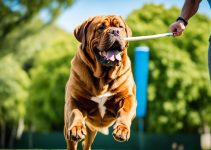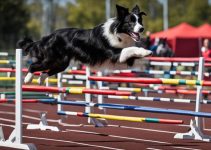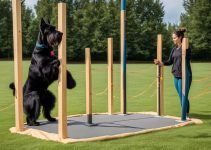Greetings! If you’re a proud Cocker Spaniel owner, you understand the importance of training for your furry friend’s well-being. Proper Cocker Spaniel training not only promotes good manners but also enhances their social interaction skills, making them more predictable and safe. In this article, I’ll share valuable tips and techniques to ensure a happy and well-trained Cocker Spaniel.
When it comes to training your Cocker Spaniel, it’s important to focus on positive reinforcement methods. Creating a training environment that is fun and rewarding will make the process enjoyable for both you and your furry companion. These intelligent dogs may have a short attention span, so short yet frequent training sessions are more effective.
During Cocker Spaniel training, it’s crucial to provide immediate rewards after your Cocker Spaniel exhibits the desired behavior. This reinforcement strengthens the connection between the behavior and the reward. On the other hand, unwanted behavior should be ignored rather than rewarded.
Consistency is key in Cocker Spaniel training. Ensure you use clear and consistent commands, so your pet can understand what is expected of them. Instead of reprimanding your furry friend, opt for positive reinforcement by rewarding good behavior.
Training your Cocker Spaniel can encompass various aspects, such as obedience training, housebreaking, and behavioral exercises. Let’s dive deeper into each topic to provide you with comprehensive guidance.
Cocker Spaniel Training
- Positive reinforcement and short, frequent training sessions are effective for Cocker Spaniels.
- Immediate rewards reinforce desired behavior, while ignoring unwanted behavior is crucial.
- Consistency and clear commands ensure your Cocker Spaniel understands expectations.
- Obedience training, housebreaking, and behavioral exercises are important components of training.
Training Tips for Fun and Effective Sessions
When it comes to Cocker Spaniel training, it’s important to make the sessions enjoyable for both you and your furry friend. Training should never feel like a chore, but rather an opportunity for bonding and learning together. One of the most effective methods for training dogs is positive reinforcement. This involves rewarding desired behavior with treats, praise, or playtime. By associating good behavior with rewards, your Cocker Spaniel will be motivated to repeat it.
Short and frequent training sessions work best for Cocker Spaniels, as they tend to have a relatively short attention span. Aim for multiple sessions throughout the day, each lasting no more than 10-15 minutes. This way, your dog can stay focused and engaged without getting bored or overwhelmed.
Ending each training session on a positive note is crucial. You want your Cocker Spaniel to associate training with positive experiences, so always finish with a fun activity or reward. This will reinforce the idea that training is a rewarding and enjoyable experience.
Consistency is key in Cocker Spaniel training. Use clear and consistent commands to avoid confusing your dog. Stick to a specific set of words or hand signals for each command and ensure everyone in the household follows the same approach. This will help your Cocker Spaniel understand and respond to your commands more effectively.
There are various training techniques you can incorporate into your sessions. Clicker training, where a clicker sound is used to mark desired behavior, can be an effective tool. Another technique is shaping behavior through rewards, where you gradually guide your dog towards the desired behavior. Experiment with different techniques to find what works best for your Cocker Spaniel.
In the next section, we will discuss the importance of housebreaking and crate training for your Cocker Spaniel.
Housebreaking and Crate Training
Housebreaking is a crucial aspect of Cocker Spaniel puppy training. Establishing a consistent routine and frequent trips outside can help teach them where to go to the bathroom. Crate training is also beneficial for housebreaking, as dogs naturally avoid soiling their living area. To make crate training successful, ensure the crate is comfortable with bedding and toys. Gradually introduce the puppy to spending time in the crate, using positive reinforcement to create a positive association.
During the housebreaking process, it is essential to focus on socialization as well. Exposing your Cocker Spaniel puppy to different environments, people, and animals in a controlled and positive manner can help them become confident and well-adjusted. Socialization plays a vital role in shaping their behavior and temperament for the rest of their lives.
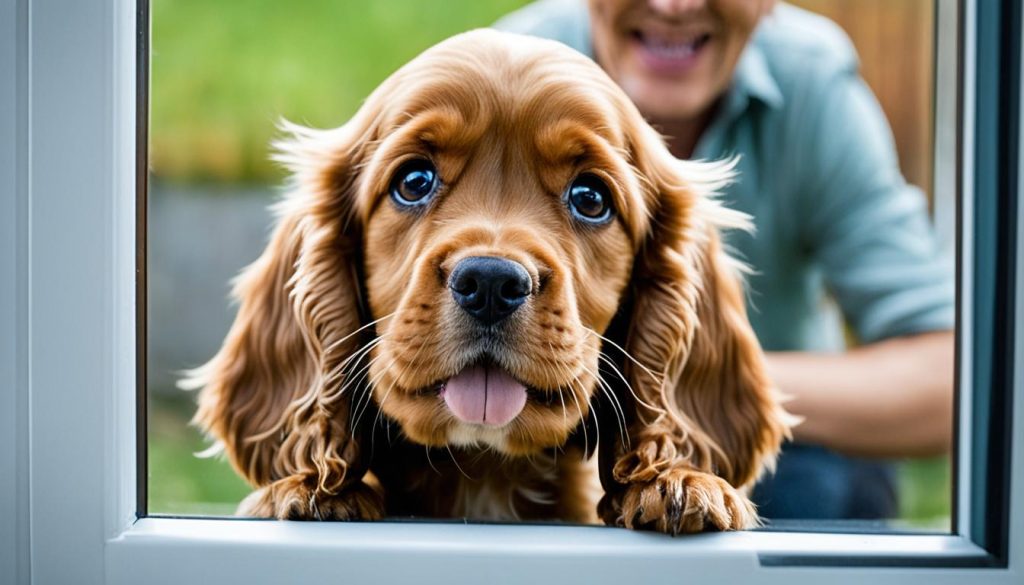
Leash Training and Basic Commands
Leash training is an essential part of Cocker Spaniel training. Many Cocker Spaniels have a natural tendency to pull on the leash, which can make walks unpleasant or even dangerous. Introducing them to wearing a collar and leash gradually can help them become comfortable with it. Start by letting them wear the collar and leash indoors for short periods of time, gradually increasing the duration. This will help them associate the collar and leash with positive experiences.
Once your Cocker Spaniel is comfortable wearing the collar and leash, you can start leash training by taking short walks indoors. This allows them to get used to the feeling of being on a leash without distractions. Slowly progress to outdoor walks, starting in a quiet, familiar environment, and gradually exposing them to busier areas. Always use a secure leash and collar that are appropriate for your dog’s size and strength.
Basic commands such as sit, stay, and come are essential for the safety and well-being of your Cocker Spaniel. Use positive reinforcement techniques to teach these commands. Reward your dog with treats, praise, and attention when they perform the desired behavior. Consistency and repetition are key in teaching these commands. Practice them in different environments and gradually increase the level of distraction.
When teaching a new command, start in a quiet and familiar environment with few distractions. Use a clear and consistent verbal cue and hand signal for each command. Make sure to reward your dog immediately after they follow the command. Over time, your Cocker Spaniel will learn to associate the command with the desired behavior.
Remember to be patient and positive during the Cocker Spaniel training process. Training takes time and effort, but the rewards are well worth it. Leash training and basic commands will help you establish a strong bond with your Cocker Spaniel and ensure their safety and obedience.
Behavioral Training and Socialization
Proper behavioral training is essential for Cocker Spaniels to address specific issues such as excessive barking, jumping, or aggression. Positive reinforcement methods are highly effective in modifying these behaviors and promoting positive changes.
Positive reinforcement involves rewarding desired behavior with treats, praise, or playtime, while ignoring unwanted behavior. By consistently rewarding and reinforcing good behavior, Cocker Spaniels learn to associate positive outcomes with the desired actions.
Alongside behavioral training, socialization plays a crucial role in ensuring Cocker Spaniels are confident and comfortable in various situations. Socialization involves exposing the dog to different environments, people, and animals in a controlled and positive manner.
Controlled exposure to new experiences helps prevent fear or aggression towards unfamiliar stimuli. Proper introductions and positive interactions with other dogs and people allow Cocker Spaniels to develop strong social skills.
The Importance of Behavioral Training
Behavioral training not only helps modify unwanted behaviors but also establishes a strong bond between the owner and the Cocker Spaniel, fostering trust and respect. Cocker Spaniel training should focus on using positive reinforcement methods to encourage desired behavior and discourage unwanted behavior through non-reward.
By consistently applying positive reinforcement methods, Cocker Spaniels are more likely to exhibit good behavior consistently. This creates a harmonious living environment for both the dog and their human companions.
Socialization for a Well-Adjusted Cocker Spaniel
Socialization is crucial for Cocker Spaniels to develop appropriate social skills and reduce fear or aggression towards unfamiliar situations. It helps them adapt to new people, animals, and environments, leading to a well-rounded and confident temperament.
Controlled exposure to different situations, such as visits to dog parks, walks in busy areas, or interactions with other dogs and people, allows Cocker Spaniels to gain confidence and learn appropriate social behaviors. A well-socialized Cocker Spaniel is more likely to have positive interactions with other dogs and people throughout their life.
Remember, when training and socializing your Cocker Spaniel, it’s important to be patient, consistent, and provide positive reinforcement for desired behaviors. Seek guidance from a professional dog trainer if you encounter specific behavioral challenges that require professional expertise.
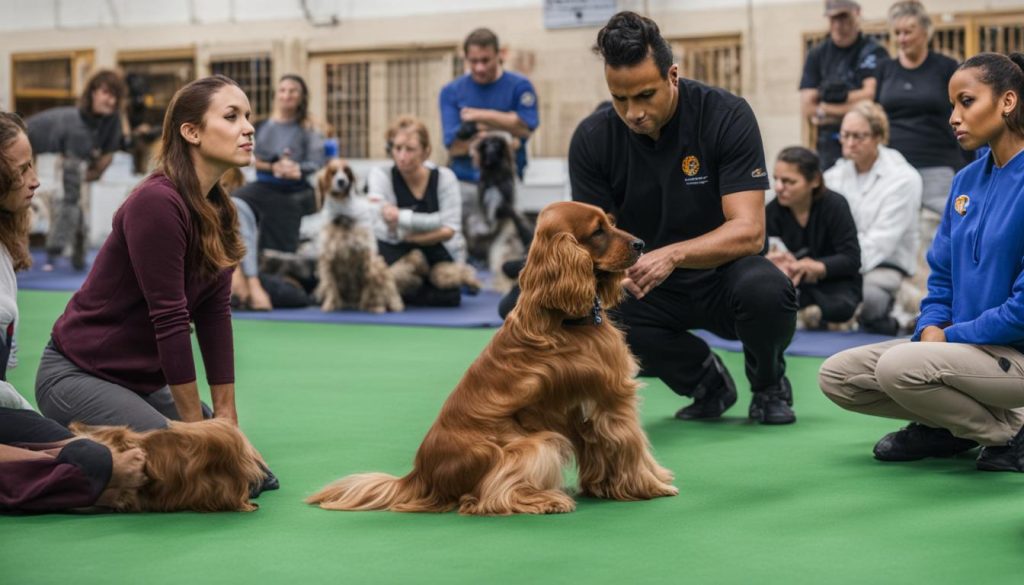
Advanced Training and Tricks
Cocker Spaniels are intelligent and eager learners, making them capable of advanced training and impressive tricks. Whether you want to enhance their obedience, teach them new commands, or introduce them to specialized activities, advanced training can provide mental stimulation and deepen the bond between you and your furry friend.
One aspect of advanced training is obedience training, where Cocker Spaniels can learn advanced commands beyond the basic sit and stay. These commands can include advanced cues like “heel,” “down,” or “leave it.” By reinforcing these commands with positive reinforcement techniques, you can encourage desired behavior and foster a well-behaved Cocker Spaniel.
Trick training is another exciting part of advanced training. Cocker Spaniels can learn impressive tricks like “roll over,” “play dead,” or even “fetch specific items.” By breaking down tricks into smaller steps and rewarding each successful attempt, you can gradually build up to more complicated tricks. Remember to be patient and consistent in your training sessions.
In addition to obedience and trick training, specialized activities like wet nose work and agility training can offer a unique challenge for your Cocker Spaniel. Wet nose work involves using their incredible sense of smell to find hidden objects and can be a fun and mentally stimulating activity. Agility training, on the other hand, involves guiding your Cocker Spaniel through a series of obstacles, such as jumps, tunnels, and ramps, showcasing their agility and athleticism.
- Start by introducing basic agility equipment, like low jumps and tunnels.
- Gradually increase the difficulty level as your Cocker Spaniel becomes more comfortable and confident.
- Always use positive reinforcement and rewards to motivate and encourage your furry friend throughout the training sessions.
- Make sure to provide plenty of exercise and warm-up exercises before each agility session to prevent injuries.
With advanced training and tricks, you can tap into your Cocker Spaniel’s potential and showcase their impressive abilities. Remember to practice consistency, patience, and persistence throughout the training process, as it may take time for your furry friend to master new tricks and commands. Have fun and enjoy the journey of training together!
Conclusion
Cocker Spaniel training is essential for ensuring a well-behaved and happy companion. By utilizing positive reinforcement methods, incorporating short and frequent training sessions, and maintaining consistency, owners can effectively train their Cocker Spaniels. Early emphasis should be placed on housebreaking, leash training, and teaching basic obedience commands to establish a solid foundation.
Addressing behavioral issues through targeted Cocker Spaniel training and socialization is crucial for Cocker Spaniels to feel comfortable and confident in various situations. By using positive reinforcement techniques and gradually exposing them to different environments, owners can help their dogs overcome behavioral challenges and ensure their overall well-being.
For those looking to take their Cocker Spaniel’s training to the next level, advanced training and teaching tricks can provide mental stimulation and strengthen the bond between owner and dog. Activities such as nose work or agility training can also provide physical exercise and promote the dog’s overall health.
While Cocker Spaniel training can be challenging, seeking the guidance of a professional dog trainer can be highly beneficial. A professional trainer can provide expertise, personalized guidance, and solutions to specific training needs, ensuring that both the owner and the dog have a successful training experience.
FAQ
Why is training important for Cocker Spaniels?
Training is important for Cocker Spaniels to develop good manners and social interaction skills. Well-trained dogs are more predictable and safe.
What training method should I use?
Training should be fun and focused on positive reinforcement. Using rewards such as treats, praise, or playtime can encourage desired behavior.
How long should training sessions be?
Short, frequent training sessions are best for Cocker Spaniels due to their short attention span. It is recommended to keep the sessions fun and enjoyable for both the owner and the dog.
How should I handle unwanted behavior?
Unwanted behavior should be ignored rather than rewarded. Consistency is important in training, and reprimands should be used sparingly and replaced with rewarding good behavior.
How can I housebreak my Cocker Spaniel?
Housebreaking involves establishing a consistent routine and taking the puppy outside frequently. Crate training can aid in housebreaking by creating a comfortable environment where they won’t soil their living area.
How do I leash train my Cocker Spaniel?
Leash training can be done by introducing the dog to wearing a collar and leash gradually. Starting with short walks indoors and progressing to outdoor walks can help in leash training. Consistency and repetition are key in teaching basic commands such as sit, stay, and come.
How can I address behavioral issues in my Cocker Spaniel?
Behavioral training focuses on addressing specific issues such as barking, jumping, or aggression. Positive reinforcement methods, such as rewarding desired behavior and ignoring unwanted behavior, can be effective. Socialization is also important for Cocker Spaniels to ensure they are comfortable in different environments.
Can I teach my Cocker Spaniel advanced tricks?
Yes, Cocker Spaniels are intelligent and eager to learn. Advanced training can include obedience training, tricks, and specialized activities like nose work or agility training. Positive reinforcement and consistency are still important in advanced training.
Should I seek professional help for training?
If you’re struggling with training or addressing specific issues, seeking the guidance of a professional dog trainer can be beneficial. They can provide expert advice and personalized training techniques to suit your Cocker Spaniel’s needs.


